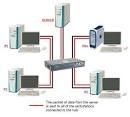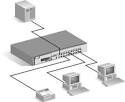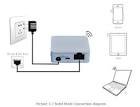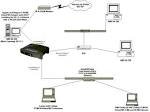Advantages and disadvantages Hubs
Hubs can be used to support the remote management as well as monitor hub ports which are known as managed hubs (Ciccarelli, Miller, Fitzgerald, & Dennis, 2012). Another function of the hubs is to enable functionality between switches and hubs, which is done by Switched hubs.
Lastly, intelligent hubs can detect and monitor the on-board processor automatically picking up traffic statistics, buffering and averting collision among other protective functions (Ciccarelli, Miller, Fitzgerald, & Dennis, 2012). Below is a diagram showing a hub connection (Ciccarelli, Miller, Fitzgerald, & Dennis, 2012).

The advantages of using hubs include the fact that they are very cheap in the market due to their simplicity. They are also in surplus making them easily and readily available hence they are the most reliable in terms of accessibility. Maintaining and deploying hubs are easy and in addition, they can connect different media, which are operating at different speeds (Ciccarelli, Miller, Fitzgerald, & Dennis, 2012). Nonetheless, using hubs has some disadvantages.
The demerits of using hubs include the fact that using hubs enhances the probability of the collision domain (Ciccarelli, Miller, Fitzgerald, & Dennis, 2012). Hubs lack the filter functionality hence passing information to all segments that are connected through them (Ciccarelli, Miller, Fitzgerald, & Dennis, 2012).
Advantages and disadvantage switches
Switches, on the other hand, are more sophisticated compared to hubs although they perform quite similar functions. Switches are specific to the intended task that Ethernet switches can only support Ethernet networks. The use of switches has increased and the demand for the product is growing fast and, consequently, the prices are escalating very fast. Switches have become much more expensive than hubs.
The advantages of using switches include their ability to limit the collision domain unlike hubs, as well as their ability to separate the network into different segments creating separate collision domains (Ciccarelli, Miller, Fitzgerald, & Dennis, 2012). The switches are also capable of supporting intelligent management and can reduce the broadcast traffic between different segments (Ciccarelli, Miller, Fitzgerald, & Dennis, 2012).
Nonetheless, one of the disadvantages of switches as I mentioned earlier is that they are quite pricey compared to hubs. Switches unlike hubs are complex and intricate to put together. Below is a diagram showing a switch connection (Ciccarelli, Miller, Fitzgerald, & Dennis, 2012)

Advantages and disadvantages MAUs
MAUs are typically easy to install and configure with an added advantage on its durability as well as reliability (Ciccarelli, Miller, Fitzgerald, & Dennis, 2012). Troubleshooting MAUs is easy while it can repair itself, a process called self-healing (Ciccarelli, Miller, Fitzgerald, & Dennis, 2012). The disadvantages consist in the following, MAUs are more expensive than both switches and hubs together. The hardware that is compatible with the MAUs is relatively unavailable in the market thus it is also very expensive.
MAUs are also specific to their tasks hence they cannot be mixed which means while using 4 Mbps one cannot use a 16 Mbps token ring at the same time. It is also important to note that MAUs can only support up to a maximum of 16 Mbps hence supporting older technology (Ciccarelli, Miller, Fitzgerald, & Dennis, 2012).
Advantages and disadvantages repeaters
Repeaters extend the network segment and can connect different types of media (Ciccarelli, Miller, Fitzgerald, & Dennis, 2012). Their main function is to increase the distance covered by a network. With their ability to increase and amplify the network, they do not enhance traffic.
However, repeaters increase the collision domain since they too cannot filter information sending all the passing information to all the nodes (Ciccarelli, Miller, Fitzgerald, & Dennis, 2012). In addition, the number of repeaters that can be used in a particular network is restricted. Repeaters also lack the capability to connect different networks (Ciccarelli, Miller, Fitzgerald, & Dennis, 2012). Below is a diagram showing a repeater connection (Ciccarelli, Miller, Fitzgerald, & Dennis, 2012)

Advantages and disadvantages bridges
Bridges like repeaters can be used to extend a network segments; only one has to choose which one is more appropriate to use. Bridges reduce collision domain and through boosting signals they increase the network distance (Ciccarelli, Miller, Fitzgerald, & Dennis, 2012). They also have the capability to filter packets and can also connect varied types of media at the same time (Ciccarelli, Miller, Fitzgerald, & Dennis, 2012). Bridges are compatible with other network gadgets in the market and they not only amplify the signal but also enhance signal clarity. With all these advantages, bridges have a number of shortcomings though.
The broadcast packets are impossible to filter using bridges, which maintains their effects on traffic. Compared to repeaters, bridges are highly priced and more complex to install and set up and they are difficult to troubleshoot (Ciccarelli, Miller, Fitzgerald, & Dennis, 2012). Compared to repeaters, bridges are a bit slower owing to their function of filtering packets and processing addresses (Ciccarelli, Miller, Fitzgerald, & Dennis, 2012). Below is a diagram showing a bridge connection (Ciccarelli, Miller, Fitzgerald, & Dennis, 2012)

Advantages and disadvantage routers
Routers create an overlay network between computer networks through forwarding data packets (Ciccarelli, Miller, Fitzgerald, & Dennis, 2012). Routers read the details and addresses of a packet data to determine its target and then it directs the packet data to the appropriate network.
Routers ensure steady and reliable network connectivity and they provide other vital services apart from packet forwarding (Ciccarelli, Miller, Fitzgerald, & Dennis, 2012). Routers are vital in enhancing data, video, and voice transfer through wired and wireless networks.
The shortcomings of routers include the fact that they are more expensive compared to all the other mentioned. Router functionality is also limited to routable protocols and it also consumes a lot of bandwidth to update it while the packet filtering function in routers increases latency (Ciccarelli, Miller, Fitzgerald, & Dennis, 2012). Below is a diagram showing a router connection (Ciccarelli, Miller, Fitzgerald, & Dennis, 2012)

Reference
Ciccarelli, P., Miller, F., FitzGerald, J., & Dennis, A. (2012). Introduction to Networking Basics (Eds). San Francisco, CA: John Wiley & Sons